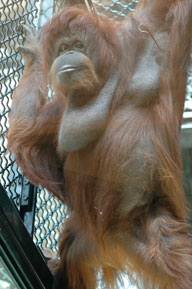Nénette
 FRANCE / 2010 / French / Color / 35mm / 70 min
FRANCE / 2010 / French / Color / 35mm / 70 min
Director, Script, Editing: Nicolas Philibert
Photography: Nicolas Philibert, Katell Djian
Sound: Jean Umansky, Julian Cloquet
Music: Philippe Hersant
Producer: Serge Lalou
Production Company: Les Films d’Ici
World Sales: Les Films du Losange www.filmsdulosange.fr
Nénette, an orangutan from Borneo who lives at a botanical garden in Paris, has reached the grand old age of 40! The longest resident of the garden, she is a popular attraction and spends every day being stared at through glass by the hundreds of men, women, boys, and girls who pass by her cage. Images of Nénette and the other orangutans overlap with the voices of the garden’s staff and visitors, with the viewer ultimately experiencing 70 minutes under Nénette’s gaze.
[Director’s Statement] The project was born pretty much by chance. One day, I went for a walk in the zoo at the Jardin des Plantes in Paris. It had been years since I’d set foot there. When I entered the “monkey house,” I stopped in front of the orangutans’ cage. Some visitors were making loud remarks about their slightest acts and gestures. On her ledge, Nénette seemed to be miles away, but when I looked at her more closely, I noticed that in fact, she wasn’t missing one bit of the spectacle that we, without our knowledge, were offering her. The idea of the film was born at that moment.
Behind her window, Nénette is a mirror. A surface of projection. We attribute to her all kinds of feelings, intentions, even thoughts. In talking about her, we talk about ourselves. When we look at her, we include ourselves in the picture. Like Flaubert, who cried, “Madame Bovary is me!”, I could say, “Nénette is me.” She’s you. She’s us. Yet, we never know what she thinks, or if she thinks. The mystery remains. Deep down, Nénette is an ideal confidante: she keeps all secrets.
It’s a film on the look, on representation. A metaphor of cinema, in particular of the documentary as the act of capturing, of taking; because to film the other is always to imprison the other, to lock the other in a frame, to fix the other in space and time.
 Nicolas Philibert
Nicolas Philibert
Born in Nancy in 1951, Philibert was 19 years old when he took part in the shooting of René Allio’s The French Calvinists as a trainee. In 1978, he made his directorial debut with the TV documentary His Master’s Voice, about the presidents of large French companies; however, it was banned from broadcast, a circumstance that prevented him from releasing new films for about six years. His international reputation was strengthened by Louvre City in 1989, and thereafter he released many highly acclaimed documentaries. With the hugely successful To Be and to Have, which drew two million people in 2002, a record for a French documentary, he established his position as a master director, and audiences all over the world await his latest works. In 2003, a retrospective of his work was held in Europe and the USA with the support of the French Foreign Ministry. Among his other works are In the Land of the Deaf (1992, YIDFF 1993), Every Little Thing (1996), and Back to Normandy (2007). |
